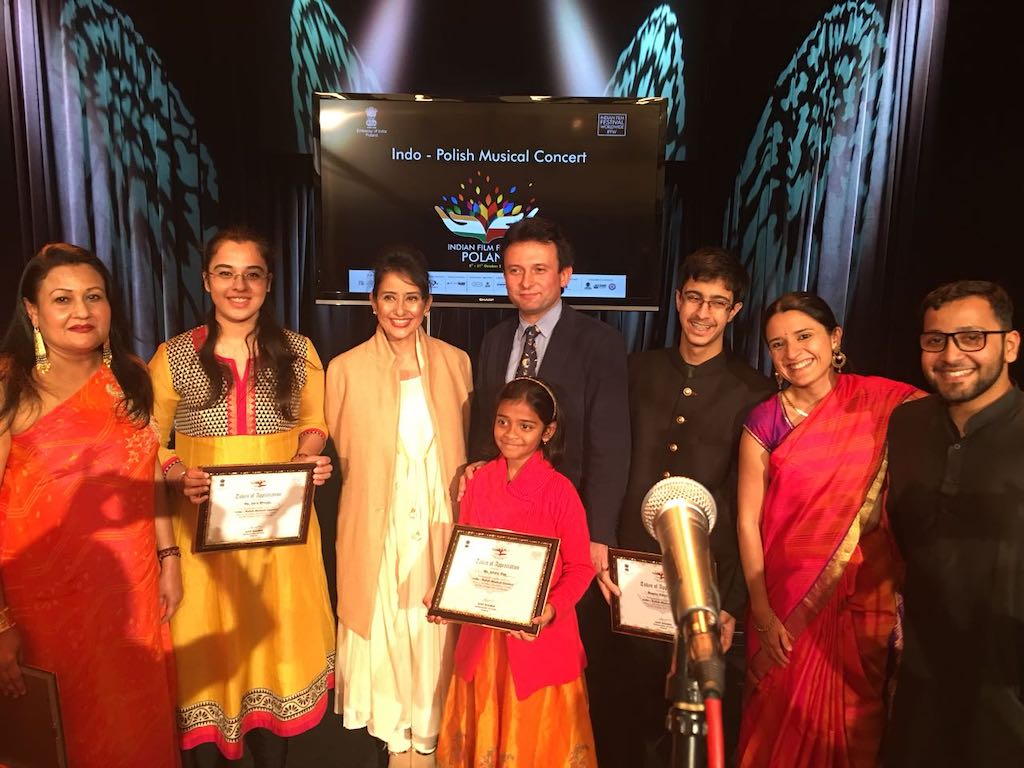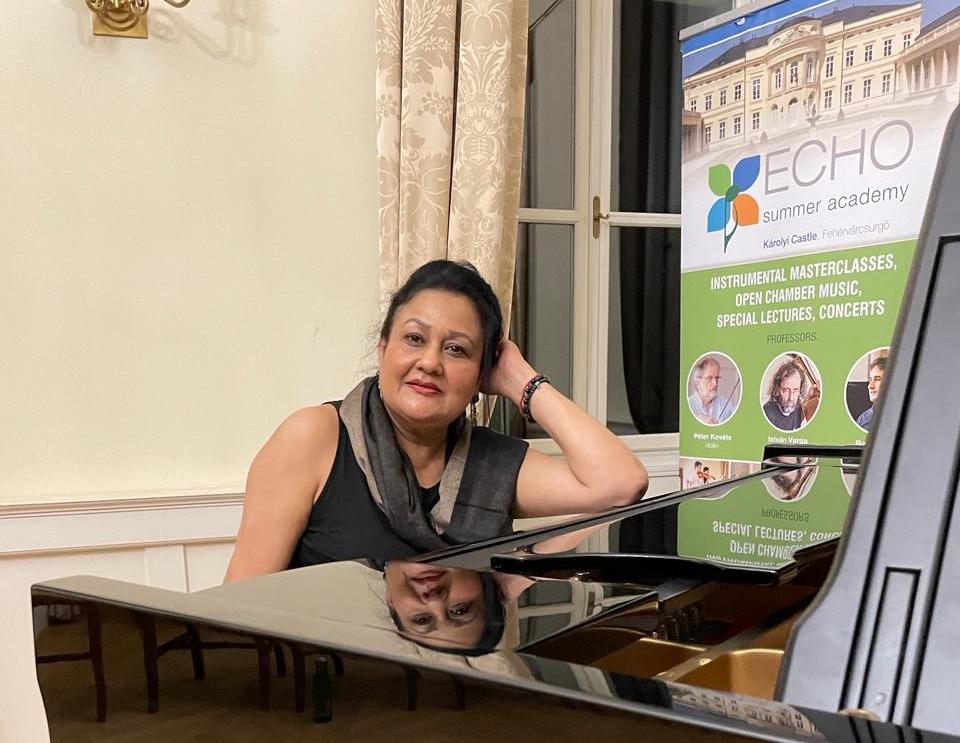Neena Roy, an esteemed educator in Western classical music, shares her insights into teaching methods, philosophies, and experiences. With a rich background in Indian classical vocal music and prestigious training at institutions like the Calcutta School of Music and the Royal College in London, Neena’s journey has been shaped by a deep appreciation for melody and cultural diversity. Through her teaching, she emphasizes the interconnectedness between music, art, and society, aiming to nurture well-rounded musicians who appreciate the complexity of Western classical music. In this interview, Neena sheds light on her passion for teaching, innovative techniques for engaging students, and the transformative impact of performance opportunities.

Neena Roy: My passion for teaching Western classical music was ignited during my musical journey, which initially centred around Indian classical vocal music. Under the tutelage of eminent gurus like Munawar Ali Khan (15 August 1930 – 13 October 1989), son of Padma Bhushan Ustad Bade Ghulam Ali Khan (2 April 1902 – 23 April 1968), I developed a deep appreciation for melody. This journey led me to study at prestigious institutions like the Calcutta School of Music and the Royal College in London.
In my teaching, I emphasize the interconnectedness between music, art, and society. I encourage students to delve into the historical and social contexts of musical compositions to deepen their understanding. Additionally, I prioritize developing their listening skills, believing that music is best understood through attentive listening and emotional connection.
For advanced students, I advocate for exploring a variety of instruments to enhance their musical expression and sensitivity. By fostering this holistic approach, I aim to nurture well-rounded musicians who appreciate the complexity of Western classical music.
ST: How do you nurture and guide your students beyond technical skills, fostering their love for music and the piano, encouraging them to become not just players but passionate performers?
NR: To nurture students’ love for music and the piano beyond technical skills, I prioritize building a strong connection with each student. Understanding their individual temperament, skills, and potential is key to fostering healthy practicing habits and a passion for performance. Drawing inspiration from Einstein’s notion that true understanding goes beyond mere knowledge acquisition, I encourage students to explore the emotional essence of music.
Incorporating singing into their practice routines, even mentally, helps students grasp the nuances and dynamics of a piece. Sight-singing proficiency further deepens their connection to the music and enhances reading skills. Analyzing music’s layers and understanding its inner and outer structures allow students to convey its intended meaning and character effectively.
By delving into these aspects, students develop a deeper connection with the mechanics of a piece, elevating their sound quality and storytelling ability. Ultimately, my goal is to cultivate passionate performers who can express themselves authentically through their music.

ST: You’re known for creating networking and performance opportunities for your students. Could you share an instance where such an opportunity significantly impacted a student’s musical journey?
NR: Creating networking and performance opportunities for my students is a vital aspect of my teaching approach. These experiences not only keep students engaged and excited about playing their instruments but also provide valuable learning opportunities. For example, during our first international performance at the Film Festival of India in Warsaw, my students shared the stage with a renowned Polish pianist and performed for the Polish radio. This experience not only earned them certificates of appreciation from the Indian ambassador to Poland but also instilled a sense of recognition and motivation crucial for their development as musicians.
I’ve witnessed such opportunities profoundly impact my students’ musical journeys. One student overcame performance anxiety after a successful performance, while another’s passion for sharing music with an audience fueled his continuous motivation. These experiences have inspired students to pursue further education in music, with some majoring in classical piano at institutions like Berklee College of Music and Stanford University.
Additionally, I regularly expose my students to comprehensive training at events like the Echo Summer Academy at Károlyi Castle, where they engage with peers from various conservatories across Europe. Looking ahead, some students are preparing to audition for the Oxford Piano Festival in August 2024, showcasing their dedication and commitment to their craft. These opportunities not only energize students but also contribute significantly to their growth and development as musicians.
View this post on Instagram
ST: How do you incorporate the broader understanding of classical music, such as music theory, historical context, or cultural significance, into your teaching?
NR: Incorporating a broader understanding of classical music into my teaching involves various elements such as music theory, historical context, and cultural significance. Understanding the logic behind a musical work is paramount, encompassing features like irregular contrasts in phrasing, imitative parts, and predicting chord progressions. This aids in efficient learning and muscle memory development, crucial for performances where memorization allows for undivided attention.
Theoretical concepts like counterpoint and harmonic progressions depict the stylistic content of a period. Integrating music history exposes students to diverse traditions, styles, and composers, immersing them in specific periods and revealing the intended interpretation of pieces. I encourage research and program note writing, drawing insights from resources like dissertation papers and journal articles.
Moreover, creating playlists of renditions by renowned pianists offers diverse perspectives. Listening to various interpretations broadens understanding and allows students to select elements resonating emotionally. This practice fosters listening and analytical skills crucial for comprehensive music education.
ST: What challenges have you faced in promoting Western classical music in your teaching community, and how have you overcome them to instil a deeper appreciation for this genre?
NR: Promoting Western classical music in my teaching community has posed significant challenges, particularly in fostering a vision of music learning beyond graded exams. In India, prestigious examination boards conduct music exams, and the recognition of music as an extracurricular activity for earning credit points adds pressure for students to excel solely in exams. Many students often discontinue their studies after obtaining certificates, mistakenly believing they have completed their piano education.
To address this challenge, I’ve focused on redirecting talented students away from this limited understanding. Some have successfully appeared for diploma exams, while others continue to study and perform out of genuine commitment. Engaging students in various activities such as competitions and year-long curriculum planning helps maintain their motivation and focus.
By emphasizing a broader vision of music education, I aim to show students that there’s more to music than exams. This approach fosters a holistic understanding and appreciation for Western classical music, guiding students towards deeper learning and fulfillment in their musical journey.
ST: Can you recall a moment where you witnessed a breakthrough in a student’s musical journey that truly exemplified the impact of your teaching philosophy?
NR: Certainly, I’ve witnessed numerous breakthrough moments in my students’ musical journeys, exemplifying the impact of my teaching philosophy. For instance, Keya Kalra Gupta at Yale, Sara Kothari at Stanford, Kabir Sethi at Oberlin, and Apurva Gauri at Berklee are just a few examples of students who have continued their music education beyond graded exams. Their successes reflect not only their dedication but also the holistic approach to music education that I advocate.
ST: Looking ahead, what legacy do you hope to leave through your students and your contributions to the world of classical music education? What are your future aspirations in this field?
NR: My legacy in classical music education aims to transcend mere technical exercises. While technical skills are vital, I emphasize the importance of preserving musical sensitivity and fostering deeper emotional connections in music-making. I advocate for cultivating an artistic vision that goes beyond virtuosity, ensuring that students communicate profound emotions and truths through their performances.
In planning repertoire, I encourage students to consider their individual abilities, selecting pieces that align with their skill level. Setting goals and deadlines for personal growth is essential, fostering disciplined practice habits. I stress the importance of productive practice, avoiding endless repetition of errors and prioritizing breaks for efficiency.
Recording performances and listening critically allow students to assess their renditions and strive for integrity and honesty in their music-making. Emphasizing a healthy technique devoid of tension is crucial for maintaining sound quality and preserving physical well-being.
Ultimately, I aspire to instill in my students a lifelong passion for music exploration and self-expression at the piano. These lessons aim to guide them on a meaningful and fulfilling musical journey, leaving a lasting legacy in the world of classical music education.




